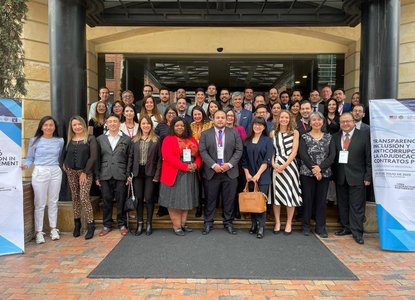Beneficial ownership: Progress in Colombia

In mid-January, DIAN, Colombia’s tax authority, mandated that companies should begin disclosing information on the individuals who ultimately own or control legal entities operating in Colombia. The move represented a significant milestone for the country, following years of legislative discussions which culminated in September 2021 when Congress approved a law to create a centralised beneficial ownership register.
Data access in Colombia
Colombia’s register is intended for internal government use, principally to help clamp down on tax evasion and to comply with anti-money laundering standards set out by the Financial Action Task Force. The data stored within the register will be directly accessible only by Colombian government officials and not, as with similar registers elsewhere, also by the private sector or the public at large. Open Ownership’s research shows that wider access to the data would allow for greater benefits by allowing more actors – including foreign law enforcement agencies – a means of easily accessing the data for transnational investigations.
Opponents of data publication in Colombia argue that the security environment does not lend itself to making beneficial ownership information available to the public. Such concerns are a common objection to public beneficial ownership registers in Latin America. Whilst implementers need to remain mindful of data protection and security issues when gathering and publishing data on individuals, successful experiences elsewhere demonstrate that mitigation strategies can minimise the risks of publication, and still enable society to access the benefits of an open register.
These strategies include creating a protection regime that enables at-risk individuals to apply for exemption from publication, and applying a system of layered access so that certain sorts of personal information (e.g. personal contact details) are only accessible to authorities. In addition, and as a recent Open Ownership briefing on national security explains, sharing beneficial ownership data more widely can have a range of positive implications.
For the new economy-wide DIAN register, the regulations do not provide for public access. Interestingly, Colombia’s Extractive Industries Transparency Initiative (EITI) multi-stakeholder group, of which the Colombian government is a member, had earlier committed to gather and publish beneficial ownership data on the subset of companies which operate in the extractives sector. Implementation had been held up by questions over the legal framework, but the approval of the September 2021 law offers an encouraging sign for renewed progress in this area. Publishing beneficial ownership data for extractive industry firms would yield important benefits for improving public oversight of that sector, and for reducing associated corruption risks.
Colombia’s implementation and the Open Ownership Principles
Debates over data publication notwithstanding, the recent moves in Colombia to legislate for, and to gather, beneficial ownership data are certainly positive. Indeed, having conducted a short review of Colombia’s beneficial ownership regulations and data schema that were published in late 2021, there appears to be much to celebrate.
Although the country is working only towards a closed register, in many other areas of its implementation plans it performs strongly against the Open Ownership Principles of Effective Beneficial Ownership Disclosure (OO Principles). The OO Principles set the standard for good governance through transparent company ownership, covering nine components of an effective beneficial ownership disclosure framework.
In Colombia’s case, the definition of beneficial ownership established in law is generally robust, with a low disclosure threshold of 5% ownership, and an explicit mention that a beneficial owner must be a natural person (as opposed to a company). The regulations provide for disclosures across the full economy, not just in one sector, and have created a legal obligation for newly established companies to disclose their beneficial owners within a two-month period. Firms must also inform authorities of any subsequent changes to the beneficial ownership structure. A series of sanctions, that are mainly financial in nature, can be applied to those that do not comply with the new laws.
As with any legislative measures, their ultimate effectiveness will depend on how they are implemented, applied, and enforced. It is often a challenge for implementing countries to adequately resource the agencies charged with processing the data, and this will be especially so in Colombia given the larger volumes of data to be gathered due to the 5% threshold level. In terms of systems and regulations, some areas where the robustness of the regime could be further strengthened can be observed. These include:
- expanding the definition of control to include explicit mention of things like rights to appoint board members to produce a fuller list of ways that ownership and control may be exercised;
- introducing further verification checks both at the point of and after submission of data; and
- including reporting obligations for firms that are entirely run by the state and for minority foreign partners in joint ventures.
The country would also benefit from the time and maintenance savings that could be gained by adopting an external data schema, such as the Beneficial Ownership Data Standard, as opposed to its current plans of creating and maintaining a proprietary data format for the work.
Future iterations of the register
Colombia’s work in creating a centralised beneficial ownership register is a welcome advance. Continuous improvements to the register over time will provide new opportunities to further strengthen the country’s disclosure regime, and potentially also broaden the scope of the groups which can access the register.
Under the Financial Action Task Force’s proposed changes to recommendation 24, other public authorities beyond the domestic tax agency would need ‘rapid and efficient’ access to verified beneficial ownership data, including for public procurement. In Colombia’s case, this would likely require some alterations to the systems and regulations which are currently proposed. Complying with these proposed changes, and implementing some of the recommendations outlined in the preceding section of this article, have the potential to bolster the comprehensiveness and quality of the data, and ultimately increase the impact that it can deliver.
